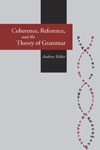A natural language discourse is not just an arbitrary sequence of utterances; a discourse must also exhibit coherence. Despite its centrality to discourse interpretation, coherence rarely plays a role in theories of linguistic phenomena that operate across clause boundaries.
In this book, Kehler provides an analysis of coherence relationships rooted in three types of ‘connection among ideas’ first articulated by the philosopher David Hume: Resemblance, Cause-Effect, and Contiguity. Kehler then shows how these relationships affect the distribution of a diverse set of linguistic phenomena, including verb phrase ellipsis, gapping, extraction from coordinate structures, pronominal reference, and tense. In each of these areas, Kehler demonstrates how the constraints imposed by linguistic form interact with those imposed by the process of establishing coherence to explain data that have eluded previous analyses.
This book will be of interest to researchers working in syntax, semantics, pragmatics, discourse, computational linguistics, psycholinguistics, cognitive science, and philosophy of language.
“This book is an extremely valuable contribution to our understanding of the interactions between syntax, semantics, and pragmatics. It will be a revelation for formal linguists who have overlooked the relevance of coherence relations among sentences in a discourse for a variety of syntactic and semantic patterns, for cognitive and functional linguists in search of a lucidly presented formal model for complex discourse patterns, and for computational linguists in search of a sensible and intuitive way of understanding discourse and coherence.”
—Mary Dalrymple
Xerox PARC
“In this beautiful book, Andrew Kehler examines a variety of syntactically-sensitive grammatical phenomena from a pragmatic perspective based on discourse coherence. This perspective–traced back through the work of Jerry Hobbs to the penetrating insights of David Hume–is extraordinarily simple, recognizing three basic discourse relations (or families of relations): Cause-Effect, Resemblance, Contiguity. An introduction and justification of this framework is followed by a series of grammatical case studies covering VP-Ellipsis, Gapping, Extraction, and the interpretation of pronouns and tenses–topics which involve a mixture of syntactic and interpretive properties. Proponents of syntactically-based theories have emphasized examples which seem impossible to reconcile with theories based on interpretive equivalence; proponents of interpretively-based theories have emphasized examples which seem to be impossible to reconcile with syntactically-based theories. Kehler argues persuasively that in each case the impasse can be resolved by observing that the opposing judgments arise in contexts involving distinct and distinguishable discourse relations. In the individual case studies, Kehler's work illuminates the spectrum of empirical data. Cumulatively, his results are theoretically important and aesthetically pleasing.”
—Richard Oehrle
University of Arizona
Andrew Kehler is a faculty member in the Department of Linguistics at the University of California, San Diego.
Read an excerpt from this book.
- 1 Introduction
- 2 A Theory of Discouse Coherence
- 3 Coherence VP-Ellipsis
- 4 Coherence and Gapping
- 5 Coherence and Extraction
- 6 Coherence and Pronoun Interpretation
- 7 Coherence and Tense Interpretation
- 8 Conclusion
- Reference
- Index
2/1/2002


